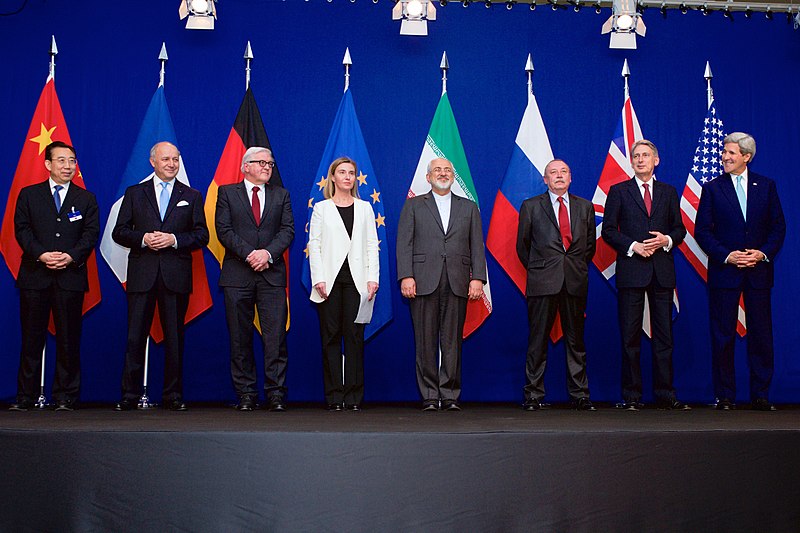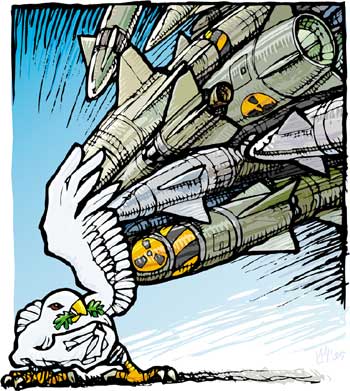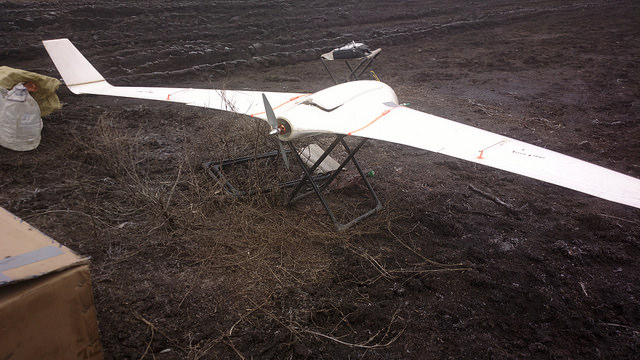Iran’s supposed development of a clandestine nuclear weapons program in violation of the nonproliferation treaty (NPT) of 1968 is a major challenge to global nuclear nonproliferation. Under the terms of the treaty, Iran was entitled to the peaceful pursuit of civilian nuclear energy while being debarred from developing any kind of weapons program. In view of Iran’s anomalous behavior in the nuclear arena, its regional rivalry with Saudi Arabia and its persistent meddling in the regional politics of the Middle East, it has remained in the cross hairs of the U.S. and other Western powers. An initial set of sanctions were imposed on the country by the West not because of Iran’s flirtation with nuclear weapons related technology, but due to a seismic shift in its internal polity in the aftermath of the American hostage crisis and the Islamic revolution of 1979. These sanctions were not of a crippling nature and continued well into the 1990s and the 2000s.
Iran was one of the main targets of the George W. Bush administration’s post-9/11 policy of preventing rogue regimes from pursuing weapons of mass destruction. Besides Iraq and North Korea, Bush castigated Iran in his now famous ‘Axis of Evil’ address to the U.S. Congress. His administration unleashed a campaign of coercive diplomacy when the Iranian regime began actively pursuing uranium enrichment activity in the early 2000s. Several Iranian nuclear scientists were found mysteriously assassinated, with murky attribution in such cases being the norm.
President Obama launched a more aggressive coercive diplomatic campaign by dramatically increasing the scale and scope of economic sanctions and orchestrating a slew of cyber-attacks, the most prominent of which was the “Stuxnet” cyber-attack, against Iran’s nuclear centrifuge equipment. These attacks were meant to cripple Iranian production of highly enriched uranium though they only had a limited effect on Iran. The punitive nature of the economic sanctions eventually persuaded a defiant Iran to engage in negotiations with the Permanent 5 +1 (U.S., U.K, France, Germany, China, Russia) countries and sign the ‘Joint Comprehensive Plan of Action (JCPOA)’ agreement. The agreement was designed to halt Iran’s ability to enrich uranium and impose a moratorium on any new weapons development activity.
Coercive Diplomacy 2.0 under Trump
The JCPOA fell under a cloud after President Trump was elected to office in January 2017. In early May 2018, Trump announced that the U.S. had decided to walk out of the deal and re-impose sanctions on Iran. Trump argued that the JCPOA did not serve American interests and those of its allies, as it left the door open for Iran to seek a nuclear weapon at a later date. He alluded to intelligence that apparently showed Iran secretly enriching uranium while remaining a party to the deal. America’s EU allies reacted with shock and disappointment, vowing to stand by the International Atomic Energy Agency’s (IAEA) monitoring regime that sought to clamp down on the nuclear program. Iran has reacted cautiously to the decision, hoping that it can ride out any new sanctions with support from Russia, China and the EU. Saudi Arabia and Israel were pleased with this outcome since both countries count Iran as their sworn enemy in the region.
At a speech delivered at the Heritage Foundation on May 21st, Secretary of State Mike Pompeo announced that the U.S. would impose far-reaching economic sanctions and implement other coercive measures that would go beyond just targeting Iran’s nuclear program. Pompeo made it crystal clear that Iran’s nuclear program cannot be separated from Iran’s destructive role in threatening Middle Eastern security. The new sanctions regime will side step the JCPOA and curtail Iran’s ballistic missile proliferation, its burgeoning cyber weapons program, undertake widespread economic strangulation, and stymie Iran’s support for terrorism. The U.S. hopes to build consensus within the U.S. Congress to craft a treaty that would address the Iranian nuclear issue. Pompeo also made the case for enhanced U.S. support in upholding the freedoms and rights of the Iranian people who are being subjected to undue economic and political hardship at the hands of the Iranian regime.
Obama’s Iran policy specifically targeted its nuclear program and turned a blind eye to other regional transgressions in Syria, Lebanon and Yemen. The Trump administration’s strategic calculus towards Iran has undergone a radical shift in tenor and substance. It has redefined the contours of America’s regional interests in the Middle East by dramatically altering Obama’s even-handed approach in managing the intractable rivalry between Iran and Saudi Arabia. By taking sides with Saudi Arabia and Israel, Trump has signaled that the U.S. is determined to confront and contain the rise of an Iran backed ‘Shia crescent’ in the Middle East.
Strategic Implications of Trump’s Decision
The Trump administration’s decision to walk out of a deal that was so meticulously stitched together by Secretary of State John Kerry and his team is expected to have wide ranging ramifications; not just for Iran’s economy, its nuclear program and the security of the Middle East, but in terms of economic reverberations that extend far beyond the region. Many EU and Indian companies who had lined up investments in Iran after the signing of the JCPOA are weighing their options in light of U.S. sanctions that cover commercial entities irrespective of their country of origin. Given Trump’s penchant for unilateralism and applying coercive pressure on both allies and foes alike, it remains to be seen if the U.S. administration will play hardball with both India and China to reduce their dependence on Iranian oil.
Russia and China’s material and technical support for the Iranian nuclear program will continue in the foreseeable future, both to balance against U.S. sanctions and to safeguard their own strategic and economic interests inside Iran. Given such an ambitious laundry list of demands being placed on Iran, it remains to be seen whether Trump’s ultra-right coercive policies will bear fruit in the near term. Will the sanctions force Iran back to the negotiating table or will a more defiant Iran draw a diametrically different set of lessons from this experience? Will Iran head in the direction of North Korea by fast tracking its nuclear program and moving towards attaining nuclear weapon status in the not too distant future? This is the million-dollar question that analysts and commentators will be asking in the coming years.
Photo: Secretary Kerry Poses for a Photot with P5+1 Leaders and Iranian Foreign Minister (2015), by U.S. Department of State via flickr. Public Domain.
Disclaimer: Any views or opinions expressed in articles are solely those of the
authors and do not necessarily represent the views of the NATO Association of
Canada.




